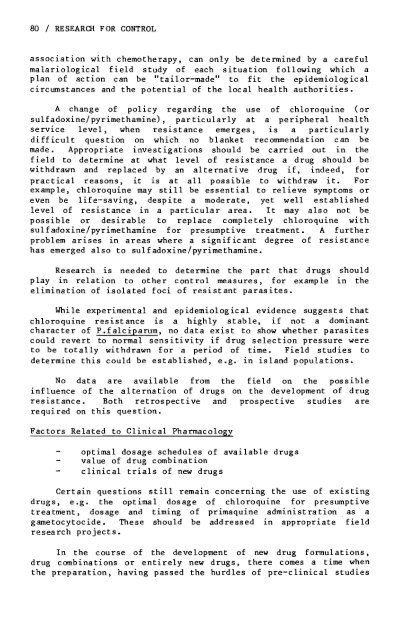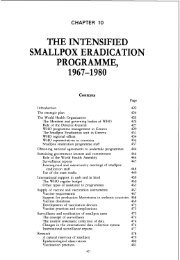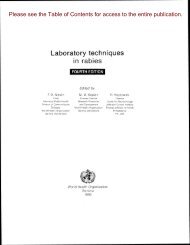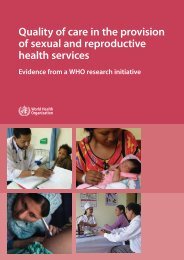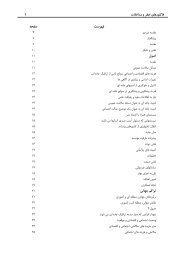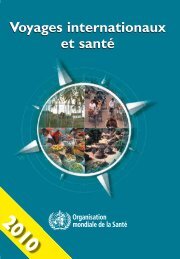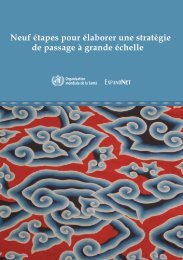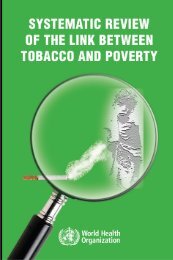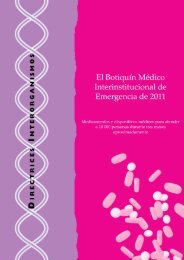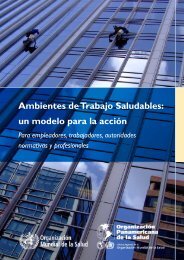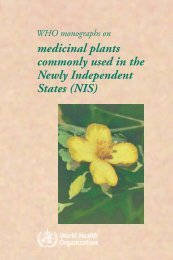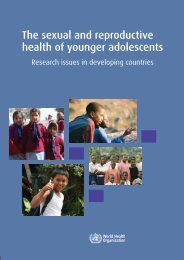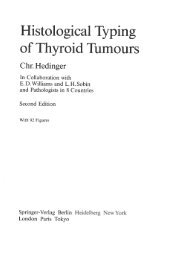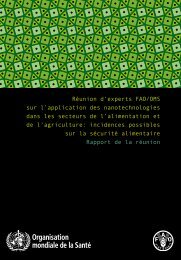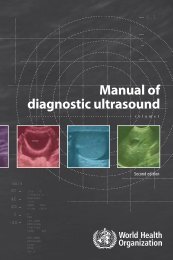Drug-Resistant Malaria - libdoc.who.int - World Health Organization
Drug-Resistant Malaria - libdoc.who.int - World Health Organization
Drug-Resistant Malaria - libdoc.who.int - World Health Organization
Create successful ePaper yourself
Turn your PDF publications into a flip-book with our unique Google optimized e-Paper software.
80 / RESEARCH FOR CONTROL<br />
association with chemotherapy, can only be determined by a careful<br />
malariological field study of each situation following which a<br />
plan of action can be "tailor-made" to fit the epidemiological<br />
circumstances and the potential of the local health authorities.<br />
A change of policy regarding the use of chloroquine (or<br />
sulfadoxine/pyrimethamine), particularly at a peripheral health<br />
service level, when resistance emerges, is a particularly<br />
difficult question on which no blanket recommendation can be<br />
made. Appropriate investigations should be carried out in the<br />
field to determine at what level of resistance a drug should be<br />
withdrawn and replaced by an alternative drug if, indeed, for<br />
practical reasons, it is at all possible to withdraw it. For<br />
example, chloroquine may still be essential to relieve symptoms or<br />
even be life-saving, despite a moderate, yet well established<br />
level of resistance in a particular area. It may also not be<br />
possible or desirable to replace completely chloroquine with<br />
su1fadoxine/pyrimethamine for presumptive treatment. A further<br />
problem arises in areas where a significant degree of resistance<br />
has emerged also to sulfadoxine/pyrimethamine.<br />
Research is needed to determine the part that drugs should<br />
play in relation to other control measures, for example in the<br />
elimination of isolated foci of resistant parasites.<br />
Whi le experimental and ep idemiolog ical evidence sugges t s that<br />
chloroquine resistance is a highly stable, if not a dominant<br />
character of p.falciparum, no data exist to show whether parasites<br />
could revert to normal sensitivity if drug selection pressure were<br />
to be totally withdrawn for a period of time. Field studies to<br />
determine this could be established, e.g. in island populations.<br />
No data are available from the field on the possible<br />
influence of the alternation of drugs on the development of drug<br />
resistance. Both retrospective and prospective studies are<br />
required on this question.<br />
Factors Related to Clinical Pharmacology<br />
optimal dosage schedules of available drugs<br />
value of drug combination<br />
clinical trials of new drugs<br />
Certain questions still remain concerning the use of existing<br />
drugs, e.g. the optimal dosage of chloroquine for presumptive<br />
treatment, dosage and timing of primaquine administration as a<br />
gametocytocide. These should be addressed in appropriate field<br />
research projects.<br />
In the course of the development of new drug formulations,<br />
drug combinations or entirely new drugs, there comes a time when<br />
the preparation, having passed the hurdles of pre-c1inica1 studies


